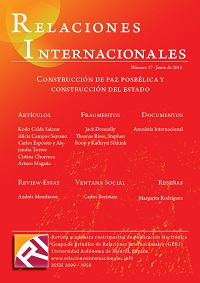The socialization of international human rights norms into domestic practices: introduction
Keywords:
Socialization, Human Rights, International SocietyCopyright (c) 2011 Thomas RISSE, Kathryn SIKKINK

This work is licensed under a Creative Commons Attribution-NonCommercial-NoDerivatives 4.0 International License.
Abstract
In this article Thomas Risse y Kathryn Sikkink analyze the importance of international norms impact over domestic politics and propose a five phases “spiral model” to explain the changes in human rights internalization by the states. They develop a theoretical framework that explains the stages and mechanisms by which international norms promote changes in international and transnational actors behavior, and that serves to a better comprehension of the general norms impact over international politics. The process by which international norms are internalized and implented on the domestic level can be understood, according to the authors, as a socialization process.





